Your air conditioner is a vital part of keeping your home comfortable, especially during hot summers. On average, a well-maintained unit can last between eight to ten years. However, without proper care, its efficiency can drop, leading to higher energy bills and potential breakdowns.
Regular maintenance, like cleaning the filter and checking for leaks, can extend its life. If you notice unusual smells or rising costs, it might be time to inspect your system. This guide will help you understand how to keep your home cool while saving money in the long run.
Key Takeaways
- Window air conditioners typically last 8-10 years with proper care.
- Regular cleaning of filters and coils improves efficiency.
- High energy bills can signal the need for maintenance or replacement.
- Address leaks and unusual smells promptly to avoid bigger issues.
- Annual inspections can extend the unit’s lifespan significantly.
Getting Started with Your window ac lifespan guide
Keeping your home cool starts with understanding your air conditioner’s lifespan. On average, a well-maintained unit can last between eight to ten years. But what factors influence this? Let’s dive in.
Understanding Your AC’s Expected Lifespan and Key Factors
Your air conditioner’s lifespan depends on several factors. Installation quality, climate, and how often you use it all play a role. For example, units in hotter climates may work harder, potentially shortening their life.
Regular maintenance is crucial. Cleaning the filter and checking for refrigerant leaks can prevent major issues. Think of it like taking care of your car—routine checks keep it running smoothly.
Why Regular Maintenance Matters for Your Home Cooling
Routine care isn’t just about extending your unit’s life. It also boosts efficiency, saving you money on energy bills. A clean filter ensures proper airflow, while checking the coils prevents overheating.
Here’s a quick checklist to keep your system in top shape:
- Clean or replace the filter every three months.
- Inspect the coils for dirt buildup.
- Schedule annual professional checks.
By following these steps, you’ll enjoy a cooler home and a longer-lasting unit.
Recognizing Early Warning Signs of AC Trouble
Spotting early signs of trouble with your air conditioner can save you time and money. Ignoring these signals might lead to bigger issues and higher costs. Let’s explore the most common red flags and what they mean for your system.
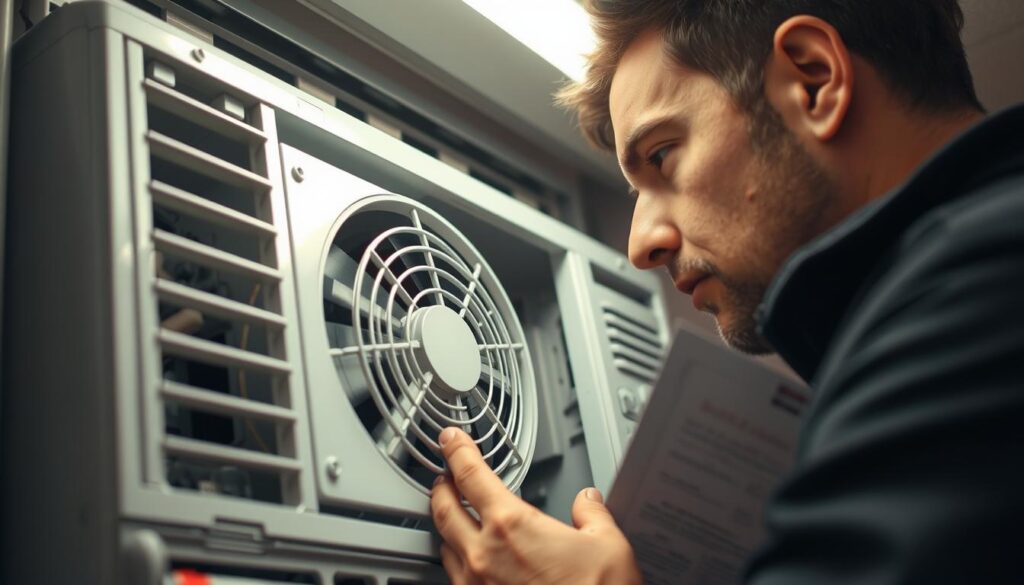
Identifying Unusual Noises and Smells in Your Unit
Your unit should run quietly and odor-free. If you hear squealing, grinding, or hissing, it’s time to investigate. These sounds often point to worn parts or refrigerant leaks. Similarly, musty or burning smells could signal mold growth or electrical issues.
Here’s a quick guide to common sensory clues:
- Squealing: Worn fan belts or motor bearings.
- Grinding: Damaged internal components.
- Hissing: Possible refrigerant leak.
- Musty smell: Mold or mildew in the system.
How Rising Energy Bills Signal Decreased Efficiency
If your energy bills are climbing, your air conditioner might be working harder than it should. This often happens when the unit loses efficiency due to dirty filters, low refrigerant, or aging components. Addressing these issues early can save you money and extend your system’s life.
| Warning Sign | Possible Cause | Action |
|---|---|---|
| High energy bills | Dirty filters, low refrigerant | Clean or replace filters, check refrigerant levels |
| Unusual noises | Worn parts, refrigerant leak | Schedule professional inspection |
| Strange smells | Mold, electrical issues | Clean system, call for repairs |
By paying attention to these signs, you can catch problems early and keep your home comfortable. If you’re unsure, a professional inspection can provide peace of mind.
Maintaining Your AC: Essential Cleaning and Filter Tips
Taking care of your air conditioner is like giving it a refreshing spa day. A little effort in cleaning and maintaining your unit can keep it running smoothly and save you money on energy bills. Let’s dive into the steps you can take to ensure your system stays in top shape.
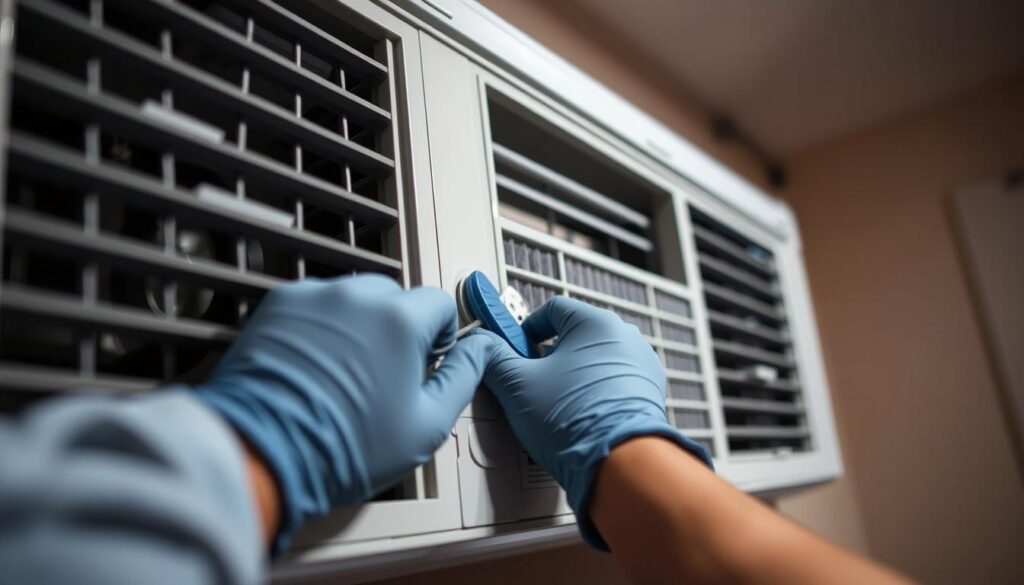
Steps for Cleaning Filters, Coils, and Checking Refrigerant Levels
Start by cleaning or replacing your filter every three months. A dirty filter blocks airflow, making your unit work harder. This simple step can improve efficiency and extend the life of your system.
Next, clean the coils. Dust and dirt buildup can reduce cooling performance. Use a soft brush or vacuum to remove debris gently. Think of it as giving your air conditioner a breath of fresh air.
Finally, check the refrigerant levels. Low refrigerant can strain your unit and increase energy costs. If you notice a drop in cooling power, it’s time to call a professional for a refill.
| Task | Frequency | Benefit |
|---|---|---|
| Clean or replace filter | Every 3 months | Improves airflow and efficiency |
| Clean coils | Every 6 months | Enhances cooling performance |
| Check refrigerant levels | Annually | Prevents strain on the unit |
Regular maintenance not only keeps your home comfortable but also saves you money in the long run. If you’re unsure about any steps, a professional inspection can provide peace of mind.
Troubleshooting Common AC Issues and Repair Strategies
Dealing with air conditioner problems can feel overwhelming, but knowing when to DIY or call a pro makes all the difference. Whether it’s a minor issue or a major malfunction, understanding your options can save you time, money, and stress.
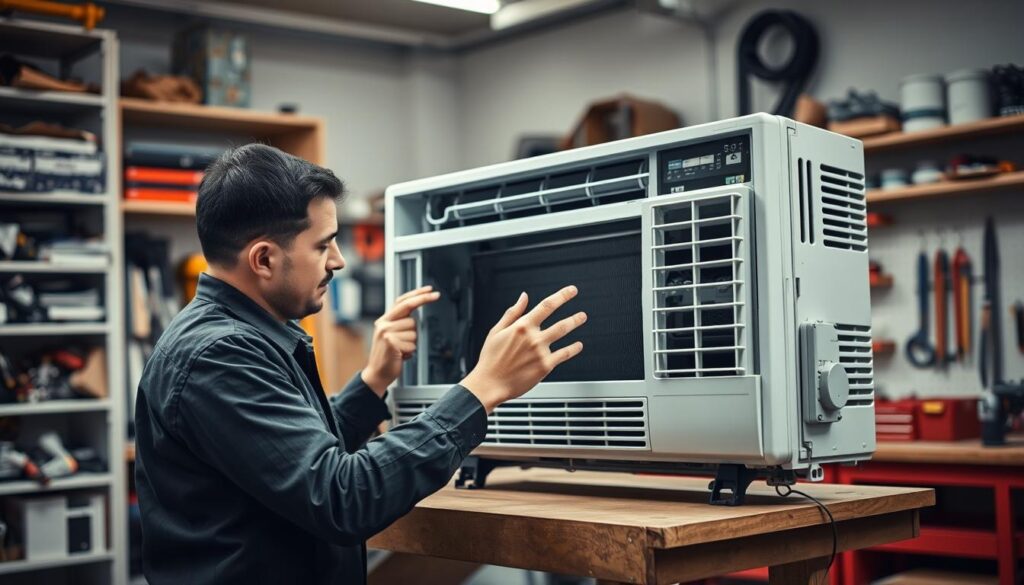
When to Attempt Repairs Versus Calling for Professional Help
Some air conditioner issues are simple enough to handle on your own. For example, cleaning dirty filters or unclogging drain lines can improve your unit’s performance. If you’re comfortable with basic tools, minor electrical wiring or cleaning connections might also be manageable.
However, certain problems require professional expertise. Persistent noises, repeated malfunctions, or high repair costs are clear signs it’s time to call an HVAC technician. Safety is crucial—troubleshooting technical parts without proper knowledge can lead to accidents or further damage.
Here’s a quick guide to help you decide:
| Issue | DIY Fix | Call a Pro |
|---|---|---|
| Dirty filters | Clean or replace | N/A |
| Clogged drain lines | Unclog with a vacuum | N/A |
| Strange noises | Check for loose parts | If persistent |
| Refrigerant leaks | N/A | Immediate call |
Proactive troubleshooting can prevent further complications. For instance, addressing minor issues early can extend your unit’s life and save you money. However, if repair costs exceed 50% of the price of a new system, investing in a newer, more energy-efficient model might be the better option.
Experts like Chas Roberts recommend weighing the benefits of repairs against the long-term costs of a new unit. By understanding your limits and knowing when to seek help, you can keep your home comfortable without breaking the bank.
Evaluating Quality, Energy Efficiency, and Long-Term Costs
Choosing the right air conditioner involves more than just picking a model. It’s about understanding how quality, energy efficiency, and long-term costs work together to keep your home comfortable without breaking the bank. Let’s break down what you need to know to make an informed decision.
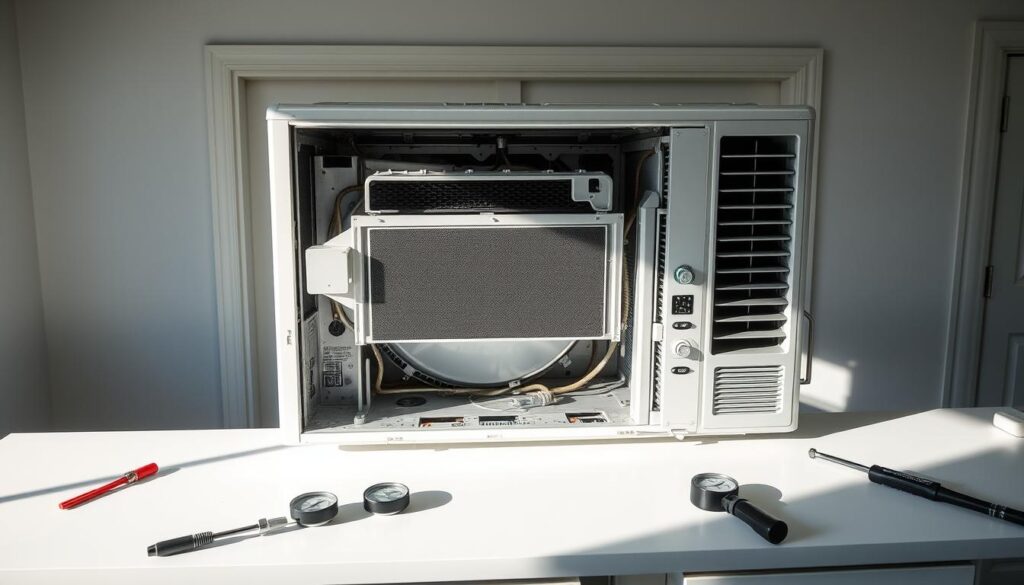
Analyzing Performance Data and Industry Research
When evaluating a unit, start by looking at performance data. Metrics like the Seasonal Energy Efficiency Ratio (SEER) rating are crucial. A higher SEER rating means better efficiency, which translates to lower energy bills over time. For example, modern units with SEER ratings of 16 or higher can save you up to 20% on cooling costs compared to older models.
Industry research shows that high-quality systems last longer and perform better. Units with advanced features, like variable-speed compressors, adapt to your home’s needs, reducing wear and tear. This means fewer repairs and a longer lifespan for your air conditioner.
Here’s a quick checklist to help you evaluate your options:
- Compare SEER ratings to find the most efficient unit.
- Check for features like smart thermostats or eco modes.
- Read reviews and performance tests to gauge reliability.
Think of this process like shopping for a car. You wouldn’t buy one without checking its fuel efficiency or maintenance history. The same logic applies to your air conditioner.
Long-term costs are another critical factor. While a high-efficiency unit might have a higher upfront cost, it can save you money on energy bills and repairs over time. For instance, studies show that energy-efficient systems can reduce annual cooling costs by up to 30%.
Finally, consider your home’s specific needs. Factors like climate, insulation, and usage patterns can impact which unit is best for you. By weighing these factors, you’ll find a system that balances quality, efficiency, and cost effectively.
Maximizing Your Air Conditioner’s Longevity in Your Home Environment
Creating a comfortable home environment while extending the life of your cooling system is easier than you think. Small changes in your daily habits and home setup can make a big difference. Let’s explore how you can keep your air conditioner running efficiently for years to come.
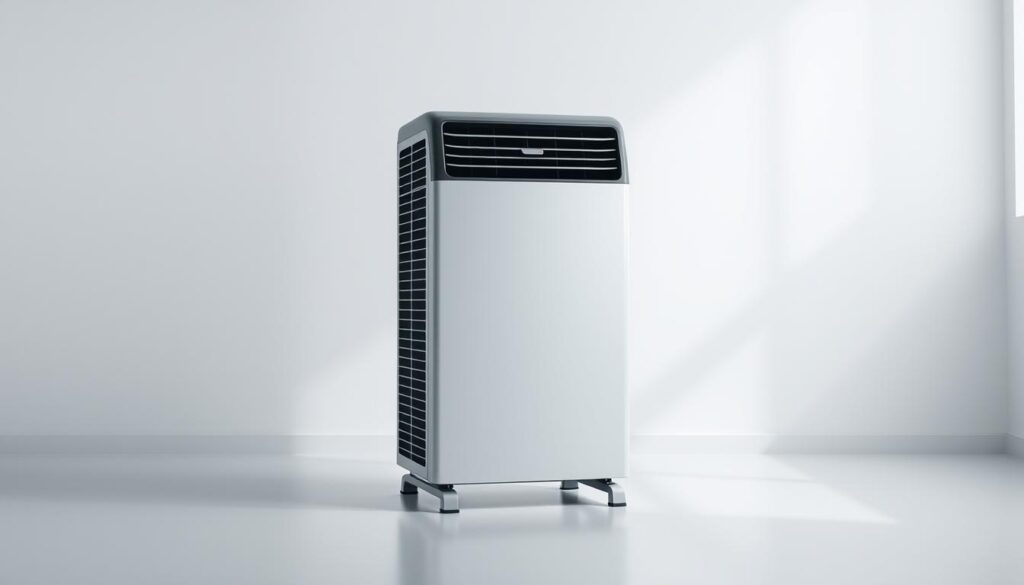
Implementing Energy Saving Practices for Better Efficiency
One of the simplest ways to reduce strain on your unit is by adjusting your thermostat. Setting it a few degrees higher during summer can save energy without sacrificing comfort. Pair this with ceiling fans to circulate cool air effectively.
Regular maintenance also plays a key role. Cleaning or replacing filters every three months ensures proper airflow. This keeps your system from working harder than it needs to, saving you money on energy bills.
Adapting to Seasonal Changes and Maintaining Optimal Temperature
Your air conditioner’s workload changes with the seasons. In warmer months, keep blinds or curtains closed during the day to block heat. During cooler months, open them to let natural warmth in.
Seasonal maintenance checks are essential. A professional inspection can catch issues early, ensuring your unit runs smoothly year-round. Think of it as a tune-up for your cooling system.
Leveraging Natural Light and Shading to Reduce Strain on Your AC
Strategic use of natural light can ease the load on your air conditioner. Install energy-efficient window coverings to block heat during peak sunlight hours. This simple step can lower indoor temperatures naturally.
Outdoor shading, like trees or awnings, can also make a difference. They reduce direct sunlight, keeping your home cooler without extra effort from your unit.
- Adjust your thermostat to save energy.
- Use ceiling fans to complement your cooling system.
- Clean or replace filters regularly for better airflow.
- Install energy-efficient window coverings to block heat.
- Schedule seasonal maintenance checks to catch issues early.
By adopting these practices, you’ll not only extend the life of your air conditioner but also create a more comfortable and energy-efficient home. Small changes today can lead to significant savings and comfort in the long run.
Conclusion
Taking care of your air conditioner ensures it keeps your home comfortable for years. Regular maintenance, like cleaning filters and checking refrigerant levels, can prevent costly repairs. Small steps, such as scheduling annual inspections, make a big difference in performance.
Watch for early signs of trouble, like unusual noises or rising energy bills. Addressing these issues promptly can save you money and extend your unit’s life. Consistent care now leads to long-term comfort and savings.
Ready to take action? Review the tips shared here and consider professional servicing if needed. Share your experiences or questions—your insights can help others too. Keep your system running smoothly and enjoy a cooler home all year round.
FAQ
How long does a typical air conditioner last?
Why is regular maintenance important for my air conditioner?
What are the early signs that my air conditioner needs attention?
How often should I clean my air conditioner’s filters and coils?
When should I call a professional for air conditioner repairs?
How can I improve my air conditioner’s energy efficiency?
What should I consider when buying a new air conditioner?
How can I reduce strain on my air conditioner during hot weather?
Source Links
- How Long is a Window AC Unit Lifespan? Comprehensive Guide
- 11 Tips to Keep Your Window Air Conditioner Running All Summer Long
- 5 Essential Steps for Window AC Upkeep
- 5 Signs That It’s Time to Replace Your Window Air Conditioner
- Wondering When to Replace Your AC Unit? Here are 8 Signs
- What are the signs that your AC needs emergency repairs? – True Blue Heating and Cooling
- Signs Your Air Conditioning System Needs Repaired in 2023
- AC Maintenance Checklist: How to Maintain Air Conditioner
- 5 Air Conditioner (AC) Maintenance Tips You Should Know
- Air Conditioner Maintenance
- Troubleshooting Common AC Repair Issues: A Homeowner’s Guide
- A Comprehensive Guide to Air Conditioner Efficiency
- How Long Do AC Units Last? Complete Guide by TemperaturePro
- Maximizing Air Conditioner’s Lifespan: Tips and Insights
- How Long Do Air Conditioners Last? A Complete Lifespan Guide
- How Long Do Window AC Units Last: Stay Cool and Informed
- How Long Do AC Units Last? Air Conditioner Lifespan Guide
- How Long Does an Air Conditioner Last? Tips to Extend Its Lifespan


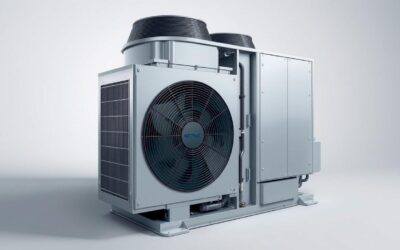
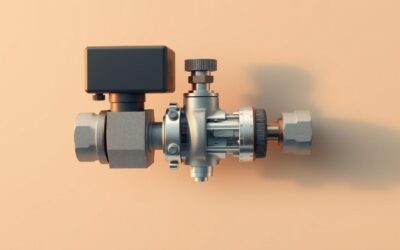
0 Comments